Everything you never wanted to know
The world went a little bit crazy since our last issue of Michigan Today. As coronavirus rages through our University, town, the country, and the world, Michigan experts have been cranking out the information. This page is in no way comprehensive, but it offers a number of links to news and feature stories, helpful tips, free courses, brilliant experts, and more. We suggest you visit Michigan Medicine and the School of Public Health for even more information.
Q&A with President Mark Schlissel
President talks with The Michigan Daily
President Mark Schlissel met with the Michigan Daily on March 27, 2020, and shared his thoughts about the University community’s response to the COVID-19 pandemic.
Daily: The University employs thousands of people and is a large public institution. What do you think the University’s responsibility is economically to its employees, students, and the state of Michigan as we enter into a recession and face a lot of uncertainty?
Schlissel: I think that our responsibility is to try to keep the University as functional as possible, while at the same time prioritizing everybody’s health and safety. So we’re not stopping working, we’re finding a different way to work. And we’re changing the way we work to decrease the rate of transmission amongst, you know, the people that work here and our students and our faculty and staff, but also as part of our own contribution to the broader societal effort to flatten the curve, to decrease the incidence and spread out this illness so our health care system doesn’t get overwhelmed. I feel a very strong obligation to our employees, our faculty, our staff, our student employees, recognizing that, you know, this is their livelihoods. So we’re doing everything that we can to continue our operations so that we continue to have the revenue we need to pay people.” (more)
Podcasts from Public Health
Social distancing is a tried and true preventive step in public health to slow the transmission of infectious diseases. As people around the United States and around the world practice social distancing and pay attention to directives to stay home during the coronavirus pandemic, we’re still seeing case counts go up. Is this an indictment of social distancing? David Hutton, associate professor of Health Management and Policy at the University of Michigan School of Public Health, discusses what we’re likely to see with continued social distancing.
More “Population Healthy” podcasts from the School of Public Health
COVID-19 Resource Guide
This guide provides information on how to access programs aimed at supporting Michiganders during the coronavirus outbreak. The programs in this guide are supported by the state and federal government, private companies, and nonprofits that serve the majority of Michigan residents, plus there is a special section for programs serving Detroit residents. This guide is not able to provide information on the numerous local assistance programs available in various communities. (more)
From U-M defensive tackle to ER doctor
Alumni Feature: Dr. Chris Hutchinson
When Chris Hutchinson returned from a spring break vacation in Naples, Fla., with his family and resumed work as an emergency room physician at Beaumont Hospital in Royal Oak, Mich., he arrived just in time for the COVID-19 pandemic to reach the doorstep of his workplace.
“You knew when you decided to get into emergency medicine that there was the potential for disasters and mass casualties and all these sorts of things,” Hutchinson said. “… but no one’s ever been through anything like this before.”
Hutchinson was an All-America defensive tackle and a captain for the University of Michigan football team in 1992, and his decision to become a doctor was sparked by an anatomy class during his sophomore year. (Read more at mgoblue.com)
Free courses, activities, exhibits offered by U-M
At home during the Coronavirus pandemic? Visit this wide-ranging resource from Michigan News, which features online learning opportunities you can enjoy right now.
In addition, U-M’s art and performance organizations and its libraries have many exhibits, performances, speakers, and other enriching resources online. Museums, galleries, and units across campus are currently working to create online content to assist K-12 and college learners. Stay up to date at arts.umich.edu
Through Michigan Online, U-M has several online learning opportunities for those who want to try something new, sharpen an existing skill, or just be enriched. U-M has a portfolio of more than 180 online learning opportunities.
Use Coursera.org/umich to start streaming on-demand video lectures today from top instructors in subjects like business, computer science, data science, language learning, and more.
Research updates
COVID-19 pandemic disrupts U-M research projects far and wide
As the COVID-19 pandemic continues its march across the globe, a wide variety of University of Michigan research projects are feeling the effects, both at home and abroad. Though these disruptions pale when compared with the human suffering caused by the disease, they are significant to the individual researchers involved. Read about a few of the U-M researchers who have been affected.
Some “good” news in the community
Researchers, community donate protective gear to aid COVID-19 fight
The first supplies gathered recently are now being sorted so they’re ready to protect staff and patients at U-M’s academic medical center and outpatient clinics in several counties.
COVID-19: Out of classrooms and clinical rotations, medical students eager to serve the community
An internal Google doc circulating among students shows an extensive list of student-driven community projects including blood donation drives, free babysitting services for frontline care providers, and much more.
Free coronavirus sequencing kits for researchers offered by U-M startup
University of Michigan startup Arbor Biosciences is providing free kits to capture the genetic code of coronavirus samples. Variations in that code reveal how the virus has morphed over time — for instance, enabling it to change from an animal disease to one that can be passed from one human to another. The information could help shed light on how the genes of the virus, SARS-CoV-2, cause the symptoms of the disease COVID-19. But more important in the long run, it could help reveal the factors that enabled the virus to become infectious in humans.
U-M pharmacy students team with Michigan Medicine to make hand sanitizer
The FDA released guidance with recommendations for appropriate preparation of hand sanitizer in response to the COVID-19 shortage. Pharmacy Dean James Dalton said he connected with Michigan Medicine about a partnership after a faculty member proposed the idea last week. The college and hospital teamed to procure ingredients, develop a recipe, and establish temporary compounding operations in pharmacy space at the hospital.
Faculty experts
The Economy
Gabriel Ehrlich is the director of the Research Seminar in Quantitative Economics at U-M, where he forecasts the U.S. and Michigan economies. In this video and Q&A, he discusses the economic impact of the coronavirus locally, nationally, and globally.
Flattening the curve
In this video, faculty members from the School of Public Health provide an update on COVID-19, why it’s important for everyone to take steps to “flatten the curve” of transmission, and what should be done going forward.
Social distancing with kids
When social distancing is a must, establishing routines, behavior management, and information on how to schedule your day can help provide some structure in a time of uncertainty. In this Q&A and video, developmental behavioral pediatrician Jenny Radesky, M.D., offers guidance.
Mental health
In this Q&A, Alison Miller, associate professor of health behavior and health education at U-M’s School of Public Health, explains methods for managing stress as well as who may be vulnerable to added mental health and stress impacts during this time.
Supply chain management
Medical supply chains are fragile in the best of times and COVID-19 will test their strength. Read this piece in The Conversation U.S. by Mark Daskin, professor of industrial and operations engineering, and Emily Tucker, PhD candidate in industrial and operations engineering.
Hoarding
Stephanie Preston, a behavioral neuroscientist in U-M’s Dept. of Psychology, studies the role of stress and emotions on decision processes. In this video and Q&A, Preston says hoarding is a normal behavior, but you need to be sure you aren’t doing it for the wrong reasons.
The history of Michigan Medicine
Stopping Contagion With Science at U-M: A Look Back
Even before scientists understood what caused them, or developed drugs or vaccines for them, U-M offered advanced care for infectious diseases.
Right now in hospitals around the world, health care professionals taking care of patients with COVID-19 are going to great lengths to protect themselves and other patients from the coronavirus that causes the disease. They might not realize it, but some of the techniques they’re using date back more than 100 years, when hospitals adopted the “aseptic technique” for inpatient care. (more)
Health and Wellness
COVID-19
Find the latest health tips, updates, and research from Michigan Health and the Michigan Health Lab on the coronavirus outbreak.
Feeling Helpless Because of Coronavirus? Here Are 11 Things You Can Do
The news about coronavirus may leave some people feeling helpless, like there’s nothing we can do but wait for the worst. But that’s not true. In fact, there are plenty of actions you can take to help those around you, and yourself – and to feel like you’re really making a difference. Sometimes in anxiety-producing situations, it can make a big difference to feel like you’re taking action to help. Even in the face of state- and city-level “stay at home” orders, there’s a lot you can do – including some acceptable reasons to leave home.
Understanding how coronavirus operates
Experts from the University of Michigan School of Public Health compiled this presentation to broaden the understanding of the coronavirus pandemic. It is not intended to provide ongoing updates of this dynamic situation, but to serve as foundational knowledge from Michigan Public Health’s faculty experts on a broad range of topics related to coronavirus. For more information on coronavirus, visit publichealth.umich.edu.
Live coronavirus Q&A from Michigan Medicine (Previously recorded)
For U-M faculty and staff
Working together in challenging times
The Michigan Center for Interprofessional Education is responding to the coronavirus pandemic in a variety of ways. “We are helping coordinate multidisciplinary efforts through enhanced communication and facilitating remote meetings,” says the center’s director Frank Ascione. “Many of our faculty are responding within their own disciplines to ensure that all students are getting the instruction they need to complete the semester.” (more)
Guide to well-being during the COVID19 Pandemic
Given the current climate, it is more important than ever to be kind to your body, mind, and mood. U-M has compiled a collection of resources and programs to support community members’ well-being every day (especially now). This page will be regularly updated, so be sure to bookmark it and share it with your U-M colleagues.

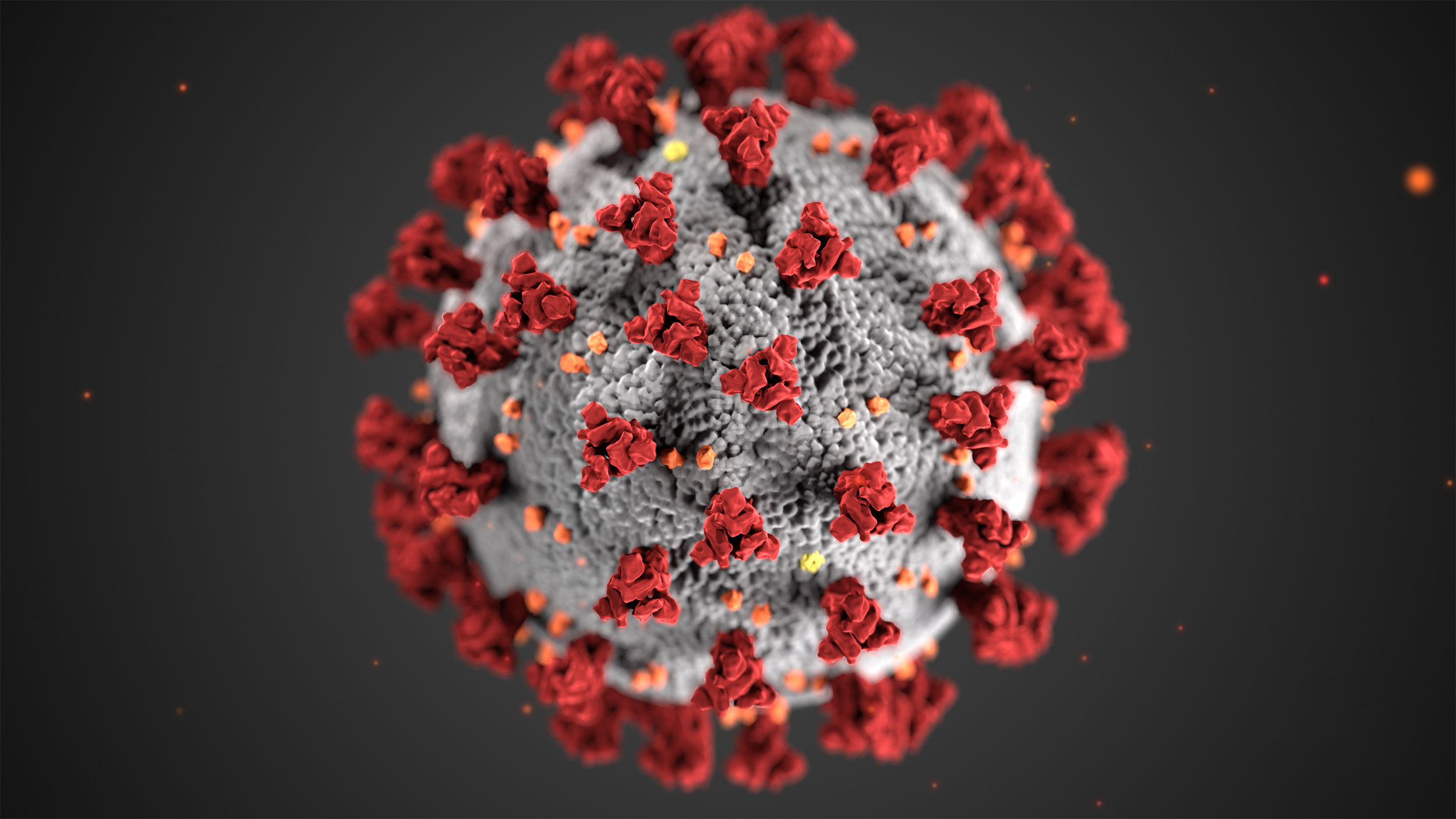

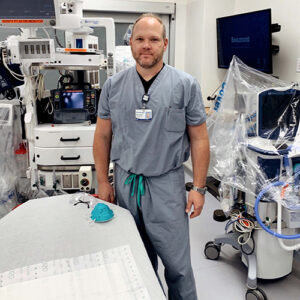
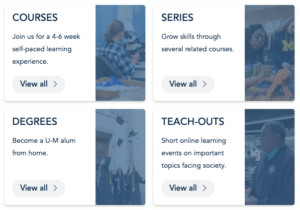
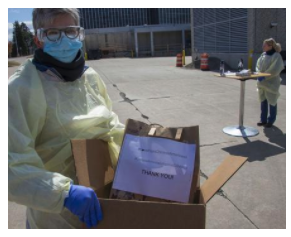
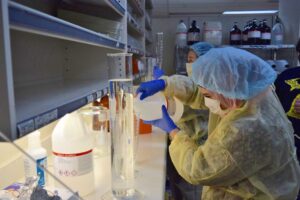
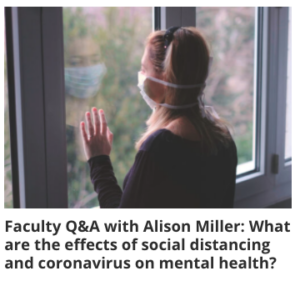
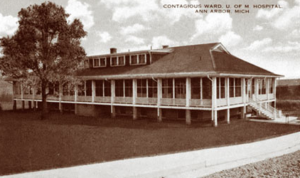

Lynn Broniak-Hull - 1976
Hello UM – with all the brilliant minds at the university, please provide some sort of timeline (even an estimate) of how long we need to feel helpless and confused about this virus. Also, what drugs have proven effective in stopping its spread?
Thank you for all your efforts,
Lynn Broniak-Hull
Reply
Davi Napoleon - LSA '66; Rackham '68
We live in a student neighborhood, a couple of blocks from East Quad, and these days, we’re finding it hard to take a walk without driving at least a few blocks from home. I’ve seen students who don’t seem to notice oncoming pedestrian traffic and would walk by us if we didn’t cross before we got too close. Once, four students turned the corner almost as we approached it and continued toward us. We darted across the street–fortunately there were no cars.
Now that we know to leave the neighborhood, it’s easy enough for us to do that, and it’s more fun to wander through different parts of town. But I’m concerned that some students aren’t taking this seriously. Although the situation is more dangerous for old folks like us than it is for the college crowd, some young people without health issues have died from Covid-19, too. And being stricken is no picnic, even for those who survive.
What can we do to urge students to take social distancing seriously?
Davi Napoleon
Reply